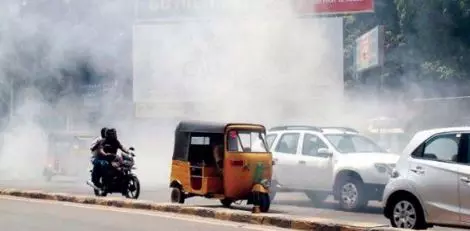Hyderabad registers 26pc dip in PM10 concentrations in 2023-24: Centre

Hyderabad: The Ministry of Environment and Forest on Monday said that Hyderabad registered 26 per cent reduction in Particulate Matter (PM10) concentrations in 2023-24 with respect to the per cent registered in the year 2017-18.
The annual average of PM10 concentrations in 2023-24 (µg/m3) in Hyderabad was 81 as against 110 in 2017-18 (µg/m3) registering a reduction of 26 per cent. This was stated by Minister of State for Environment, Forest and Climate Change, Kirti Vardhan Singh on Monday.
The Ministry also shared the details of improvement in PM10 concentrations of 130 cities across the country in FY 2023-24 with respect to FY 2017-18. As per the annual performance assessment carried out for FY 2023-24 under the programme, 97 cities have achieved reduction in PM10 levels in 2023-24 with respect to levels of 2017-18.
As many as 55 cities have achieved reduction of 20 per cent and above in PM10 levels in 2023-24 with respect to the levels of 2017-18 while 18 cities have met National Ambient Air Quality Standards (NAAQS) for PM10 levels in 2023-24.
Replying to question raised by the MPs on the steps taken to check air pollution in Lok Sabha, Singh said the Central government has launched National Clean Air Programme (NCAP) in 2019 as a national level strategy to reduce air pollution levels in targeted 130 non-attainment cities and million plus cities across the country through implementation of national, state and city level action plans.
The NCAP envisages reduction by 20 to 30 per cent in PM concentration over baseline year 2017 by 2024. Target has been revised to achieve reduction in PM10 level up to 40 per cent or achievement of national standards (60µg/m3) by 2025-26.
The cities under NCAP have prepared city action plans to take measures to improve air quality as per the objectives of NCAP. An amount of Rs.11,211 crore has been provided to cities under the programme to implement city action plans. In addition to this, NCAP emphasises on implementation of City Action Plans (CAPs) through the convergence of resources from various Central Government schemes such as Swachh Bharat Mission (Urban), AMRUT, Smart City Mission, SATAT, and Nagar Van Yojana, as well as resources from State governments and UT administration and agencies like Municipal Corporations and Urban Development authorities.
